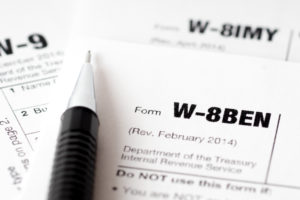As foreign investment in the United States continues to rise, and investors are increasingly turning to tax-transparent vehicles such as partnerships to make those investments, the intricacies of the partnership tax withholding rules have become as increasingly important.
Many taxpayers are not aware that a foreign partner of a partnership (whether it is a domestic or a foreign partnership) that is engaged in a U.S. trade or business is, itself, deemed to be engaged in a U.S. trade or business. I.R.C. § 875(1). This treatment carries a number of potential consequences. For instance, each foreign partner is generally required to file an income tax return with the IRS (e.g., Form 1120-F for a foreign corporate partner or Form 1040NR for a nonresident individual partner).
There are consequences for the partnership as well. A partnership with income that is effectively connected (ECI) with a U.S. trade or business is required to withhold on the ECI that is allocable to its foreign partners.[1] I.R.C. § 1446(a), (b). (Note that there is a special regime available to Publicly Traded Partnerships). The withholding rate for such income allocable to non-corporate foreign partners is 39.6% and 35% for corporate foreign partners. A partnership that fails to withhold can be subject to liability for the required payment—plus penalties and interest. Reg. § 1.1441-1T(b)(7). This applies even if the partnership does not have a U.S. TIN for the partner.
A threshold issue that arises in this context is whether the partner is a foreign person. The partnership should generally request either a W-9 (for a U.S. person) or an appropriate W-8 (for a foreign partner)—e.g., a W-8BEN, W-8IMY—to make that determination and to analyze whether more beneficial rules may apply to the partner.
A partnership makes any required section 1446 withholding payments through Form 8813, Partnership Withholding Tax Payment Voucher (Section 1446), and Form 8804, Annual Return for Partnership Withholding Tax (Section 1446). The partnership must also provide a required notice to each foreign partner of the withholding within 10 days of payment, Reg. § 1.1446-3(d)(1)(iii), and send notice to each foreign partner at the end of the partnership’s year through Form 8805, Foreign Partner’s Information Statement of Section 1446.
Notably, the section 1446 withholding regime described above does not apply to income that is not effectively connected with the partnership’s U.S. trade or business—e.g., FDAP income. But other withholding obligations fill in that gap: U.S.-source income that is not effectively connected with the partnership’s U.S. trade or business may give rise to separate Chapter 3 withholding obligations under sections 1441, 1442, and 1443. Such income may be required to be reported on Form 1042, Annual Withholding Tax Return for U.S. Source Income of Foreign Persons, and Form 1042-S, Foreign Person’s U.S. Source Income Subject to Withholding. This withholding regime generally requires a 30% withholding on gross payments of FDAP, although an applicable treaty may change this rate.
A partnership can also have withholding obligations under the Foreign Investment in Real Property Tax Act of 1980 (FIRPTA). For instance, a partnership that acquires a U.S. real property interest from a foreign person may have withholding obligations under I.R.C. section 1445.
Of course, partnerships making certain payments can also incur separate Chapter 4 withholding obligations. Withholdable payments made to a Chapter 4 payee can give rise to separate withholding liability.
[1] Note that the partnership may be able to reduce the foreign partner’s share of gross ECI through certain deductions and losses if the foreign partner makes required certifications. The partner’s tax treaty benefits related to the income may also reduce the foreign partner’s share of the partnership’s effectively connected income.
Expert Tax Defense Attorneys
Need help with tax issues? Contact us as soon as possible to discuss your rights and the ways we can assist in your defense. We handle all types of cases, including complex international & offshore tax compliance. Schedule a consultation today!

